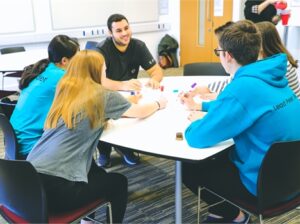As we settle into the new academic year, I wanted to take a moment to highlight one of the most impactful student-led initiatives we have at Bath: Peer Assisted Learning (PAL).
Over the summer, I had a great conversation with three people closely involved in PAL at Bath:
- Penn Mackintosh, a Computer Science student who recently returned from placement and is now a Senior PAL Leader
- Dr Tom Arnot, Senior Academic Advisor in Chemical Engineering, who’s helped embed PAL across multiple year groups in his department, and
- Pia Brinkschulte, Peer Support Coordinator in the SU, who leads the development of PAL schemes across the University.
Their insights reminded me just how powerful PAL can be - not just for those attending sessions, but for those leading them, and for the departments that support them.
What is PAL?
PAL stands for Peer Assisted Learning, a globally recognised model where students support other students in their learning. At Bath, PAL is part of our wider Peer Support programme and is closely aligned with the European Centre for SI-PASS. It provides a confidential, student-led space where students can revise course materials, practise vital skills, and ask questions they might not feel comfortable asking in lectures.
Sessions are typically led by trained students from the year above, who know what it’s like to tackle the tricky parts of a course and come out the other side. As Pia explained, PAL helps students build confidence, communication, and leadership skills, while fostering a sense of belonging in their department.

Expanding PAL across the University
One of the things I’m most excited about this year is the expansion of PAL into new areas. Pia discussed the fact that PAL is hoping to be introduced for Year 1 students in Architecture for the first time, and Pharmacy and Chemistry are both adding PAL to additional year levels. We have also been able to offer PAL for Pharmacy students at Plymouth - a fantastic development.
In Chemical Engineering, PAL is already supporting students across three year groups - Years 1, 2, and 3 (final year) - which is unique across the University. This structure allows students who’ve completed placements to mentor those preparing for them. Tom shared how mentoring across year groups not only embeds academic development but also helps students prepare for professional life.
Why does it matter?
Penn spoke passionately about how PAL helped consolidate his own learning and gave him the confidence to explain complex ideas – a skill that proved invaluable when applying for placements - and could also benefit students on placement, study abroad, and for their future career.
PAL also benefits staff. As Tom put it, “If it’s done well collectively, you save time.” Students who feel empowered to ask questions and support one another often come to lectures more engaged and confident.
How can staff get involved?
If your department already runs a PAL scheme, now is a great time to reconnect with your PAL champion and support the programme. If your department doesn't yet have a scheme, Pia and her team are ready to help you set one up - all it takes is a willing staff member to act as a champion.
I heard how PAL works best when it’s student-led but staff-supported. Champions help with things like timetabling, Moodle access, and recruitment- and they don't have to do it alone. There’s a growing network of support across the University, and departments are increasingly recognising PAL's value - not just for students, but for staff and the wider learning community.
A final thought
PAL is a brilliant example of what happens when we trust students to lead, and when we support them to do so. It builds skills, confidence, and community - and it’s something I’d love to see in every department.
So whether you’re a student thinking about becoming a PAL Leader, or a staff member wondering how to support a scheme, I encourage you to get involved. Let’s keep growing this fantastic initiative together.
Check your department’s PAL scheme or speak to the Peer Support Team to find out how to get involved: www.thesubath.com/peer-support/pal
Contact me directly at pro-vc-se@bath.ac.uk if you have a question or would like to suggest future topics for my blog.
Respond
